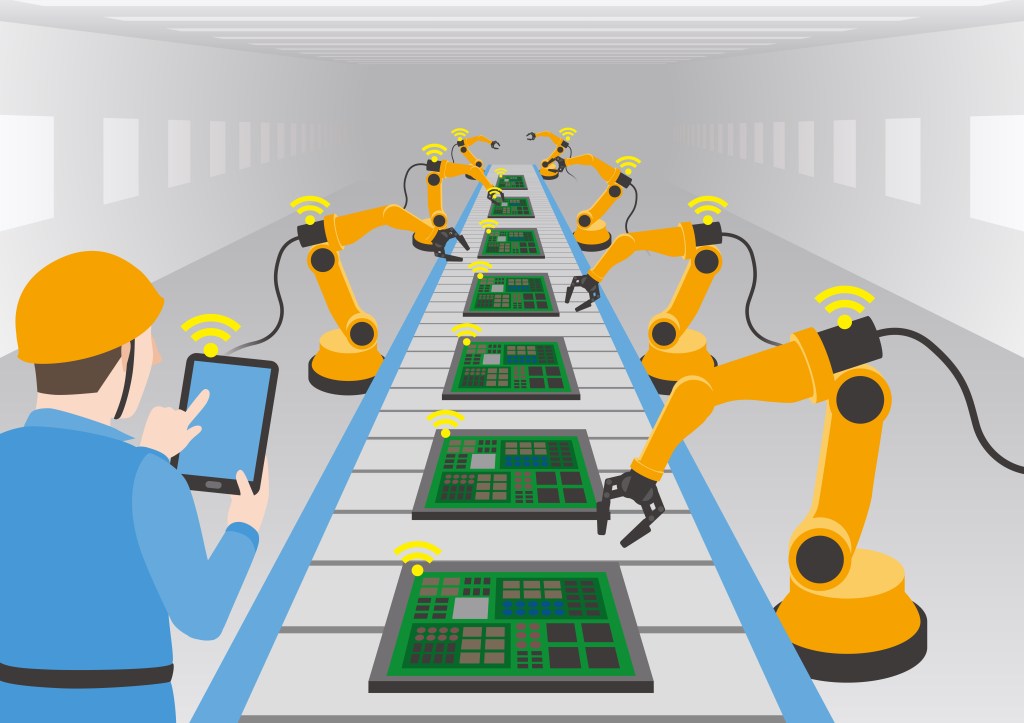Many eyes may be gazing toward the sky in anxious anticipation of new drone delivery systems, but an increasing number of intelligent robot systems is already on the ground, in warehouses and manufacturing facilities, helping to manufacture and move products across the globe.
These automated systems, which employ the world’s most innovative advancements in software, artificial intelligence and machine learning, are transforming the core process of how each and every product is produced and delivered.
Beyond amazing developments within robotics, we need to recognize the equally significant advancements in machine vision that are driving the vast applications transforming industries today. Vision guided vehicles (VGVs) are becoming more necessary to transport heavy loads autonomously and ensure two-day, next-day and same-day deliveries. We’re seeing deployment of VGVs throughout manufacturing and advanced fulfillment facilities across multiple industries, including automotive, industrial product development and retail.
In this post, we’ll explore three companies set to make waves in the near future for the autonomous robot industry. As a pioneer of 3D vision technology for warehouses and fulfillment centers, we’re excited to see how these new innovations will improve and streamline supply chains.
Starship’s ground drone
Starship Technologies, the new venture by Skype co-founders Ahti Heinla and Janus Friis, is introducing autonomous robots to a street corner near you. Designed to address the “last mile” — the notoriously difficult final leg of the delivery process — the Starship bots will deliver groceries and small packages to suburban homes.
Operating autonomously 99 percent of the time, each robot uses high-resolution navigation software to pinpoint its location, and a camera and radar to avoid obstacles. The mini-fridge-sized vehicles will have speakers and microphones to chat with humans, and their six-wheel treads can even climb small staircases.
The firm will launch a beta program in Greenwich, London and in the U.S., so keep an eye out for these robots scooting around our sidewalks soon.
Tally, the retail robot
Don’t be surprised if sometime in the near future, as you urge your shopping cart around the busy aisle at your local grocery store, you come face to face with a tall, cylindrical robot, quietly scanning the shelves as it zips noiselessly past you.
That’s the future envisioned by Simbe Robotics, a Silicon Valley startup whose robot, cutely named Tally, monitors grocery story inventory, ensuring that items are properly stocked, in the correct section and priced accurately. A single Tally robot, moving four feet at a time and pausing to take a hi-res photograph, can scan more than 15,000 items per hour.
Although Tally can’t rectify the errors it spots, it does send the data it captures to the cloud for processing, then presents recommendations to retailers through a mobile app.
The real winning element here is that, like our VGVs, Tally does not need special store infrastructure to do its job, and can function safely amongst customers and staff during business hours. And like iRobot’s Roomba, it will return to its charging dock when running low on power.
Swarms of farming bots
With the human population steadily increasing, our ability to efficiently grow, harvest and distribute food is now a global issue. The world’s agricultural industry will need to feed 9 billion people by 2050, which is why David Dorhour, an Iowa inventor, is working on a swarm of robots that could revolutionize the agricultural industry.
Prospero, the name for the initial prototype, is a small, six-legged bot that, when joined with hundreds of other identical bots, will form a swarm of farming robots that can quickly and accurately plant acres of land. Prospero requires no GPS or complex vision software — it sees only what is directly beneath it. If it detects a patch of soil with no seed, it plants one at a precise depth, sprays it with a preprogrammed amount of fertilizer and nutrients, covers the seed and marks the spot with a shot of fluid, which lets other robots know that this small area is already planted. When the swarm is at full force, all the robots will be planting simultaneously.
Each Prospero bot will have radio communication, so if one comes across a large section of dirt with no seeds, it can signal others to come help; similarly, if it finds a patch that is planted too densely, it will let its fellow bots know to work elsewhere.
By programming the robots to use simple communication instead of constantly monitoring each other’s locations, Dorhour cuts down on the computing power needed and makes the system more feasible for users in rural areas. And the swarming technology provides farmers with the ultimate control: While agriculture today happens at the field-by-field level, with these robots, farmers could make plant-by-plant decisions.
We no longer need to look to the skies for the next wave of robotics to transform our world: They’re already at our feet.
For some, the notion that intelligent machines will play a formidable role in the economy of the future is worrisome. Martin Ford, in his book Rise of the Robots: Technology and the Threat of a Jobless Future, predicts a dark and radical shift in the labor force as human workers are muscled out of their professions by cheaper, smarter robots.
While it’s true that tomorrow’s industries will likely look quite different than they do today, I anticipate a workplace where humans and robots work in collaboration. Researchers from Boston University seem to agree. Robots are incredibly proficient at performing repetitive and routine tasks, but there is simply no replacement for human creativity, empathy and intellect.
As we begin 2016, we should embrace the automation technology that helps us move goods around the planet — and look forward to a future where robots make all our jobs less mundane.































Comment